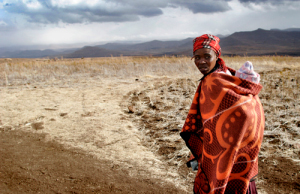Minorities the forgotten victims of climate change
Minorities and indigenous people frequently bear the brunt of the ravages of climate change but also often come last on the aid list because they are on the margins of society.
|
Indigenous peoples often inhabit marginal lands and, because they depend on nature for their survival, face double jeopardy from the changing climate which is altering growing seasons and rainfall patterns. |
Minorities and indigenous people frequently bear the brunt of the ravages of climate change but also often come last on the aid list because they are on the margins of society.
Some are even the victims of efforts to tackle global warming such as clearing tracts of land and forest for growing biofuels, according to "State of the World's Minorities 2008" report from Minority Rights Group International (MRG).
"Climate change has finally made it to the top of the international agenda at every level but recognition of the acute difficulties that minorities face is often missing," said MRG's policy chief Ishbel Matheson.
"From the immediate aftermath of a disaster to the point of designing policy on climate change - the unique situation of minority and indigenous groups is rarely considered."
Scientists say global average temperatures will rise by between 1.8 and 4.0 degrees Celsius this century due to carbon emissions from burning fossil fuels for power and transport. This will melt ice caps, raise sea levels and cause more floods, droughts and storms, putting millions of people at risk.
The MRG report said forgotten minority groups often live in areas rejected by the wealthy because of their riskier location. Indigenous peoples also often inhabit marginal lands and, because they depend on nature for their survival, face double jeopardy from the changing climate which is altering growing seasons and rainfall patterns, it said. And when disasters hit and relief efforts swing into action, these same groups are often the worst affected but the last to be helped.
It said governments had to start building their plight into policies on climate change.
The push into biofuels and moves to offer incentives to prevent deforestation were cases in point, it said. Mass clearance of land for biofuels was not only not helping the environment, it was depriving local people of their livelihoods.
And any deal struck on deforestation in negotiations to extend and expand the Kyoto climate change protocol beyond 2012 must be flexible enough to allow indigenous people to carry on their way of life, the report said.
"Not only are minorities and indigenous groups disproportionately suffering as a result of climate change but they are affected by what the world sees as solutions to climate change," Matheson said.
The annual report, which this year focuses on the impact of climate change, said it was high time the poor and marginalised people of the world were put on the political map.
Source: Reuters News Service



